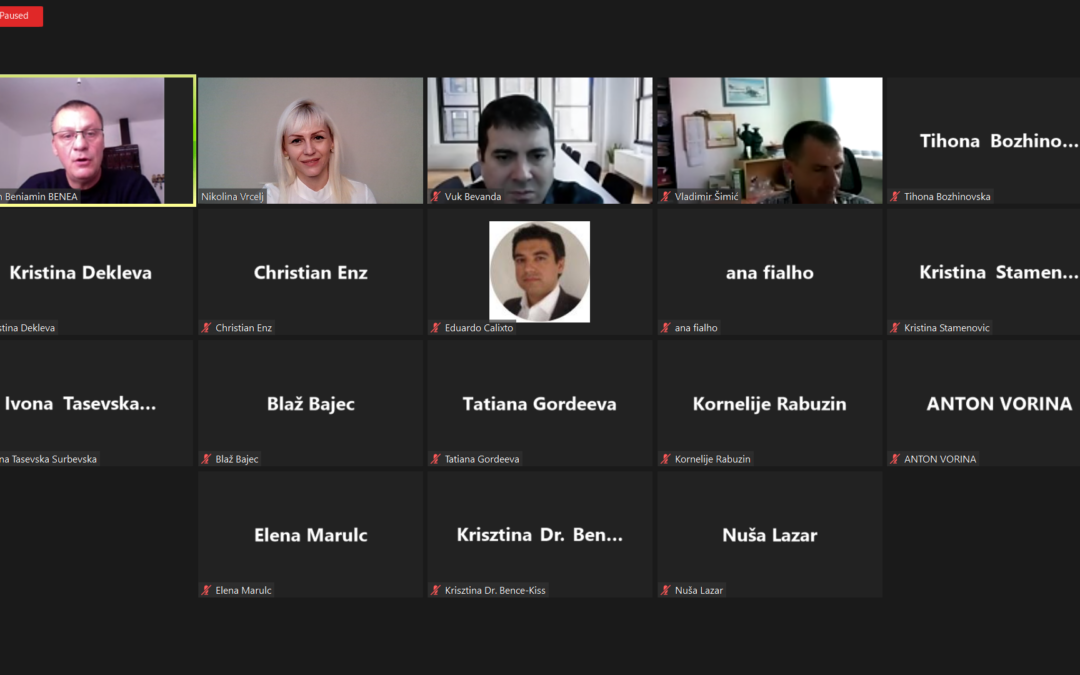Márcia R.C. Santos – ESCE, Instituto Politécnico de Setúbal, Portugal and Information Sciences and Technologies and Architecture Research Center (ISTAR-IUL) at Instituto Universitário de Lisboa (ISCTE-IUL), Portugal
Rui Dias – ESCE, Instituto Politécnico de Setúbal, Portugal and CEFAGE-UE, IIFA, University of Évora, Portugal
Paulo Alexandre – ESCE, Instituto Politécnico de Setúbal, Portugal and CICE, Polytechnic Institute of Setúbal, Portugal
Paula Heliodoro – ESCE, Instituto Politécnico de Setúbal, Portugal and CICE, Polytechnic Institute of Setúbal, Portugal
DOI: https://doi.org/10.31410/ITEMA.S.P.2021.47
5th International Scientific Conference on Recent Advances in Information Technology, Tourism, Economics, Management and Agriculture – ITEMA 2021, Online/virtual, October 21, 2021, SELECTED PAPERS published by the Association of Economists and Managers of the Balkans, Belgrade; Printed by: SKRIPTA International, Belgrade, ISBN 978-86-80194-50-9, ISSN 2683-5991, DOI: https://doi.org/10.31410/ITEMA.S.P.2021
Abstract
Financial theory encompasses several financial domains, as management, budgeting, or investing. Over time, different topics have been addressed in financial policies in different countries, which were followed by academics. During the COVID-19 pandemic, specific crisis-related issues have been addressed to contribute to the financial dimensions of individuals and companies. In order to map the literature addressing financial issues and to locate the research topics in content and time, this study conducts an automated computer analysis of the bibliometric data addressing financial issues related to the COVID-19 pandemic. The analysis provides empirical evidence of the main research channels and the topics receiving the most attention in 2020.
Keywords
Financial theory; Literature; COVID-19 pandemic
References
Aburumman, A. A. (2020). COVID-19 impact and survival strategy in business tourism market: the example of the UAE MICE industry. Humanities and Social Sciences Communications, 7(1), 1–11. https://doi.org/10.1057/s41599-020-00630-8
Akhter-Khan, S. C., & Wai, K. M. (2020). Can COVID-19 Move Myanmar in the Right Direction? Perspectives on Older People, Mental Health, and Local Organizations. The American Journal of Geriatric Psychiatry, 28(9). https://doi.org/10.1016/j.jagp.2020.06.004
Bartik, A. W., Bertrand, M., Cullen, Z., Glaeser, E. L., Luca, M., & Stanton, C. (2020). The impact of COVID-19 on small business outcomes and expectations. Proceedings of the National Academy of Sciences, 117(30). https://doi.org/10.1073/pnas.2006991117
Barzilay, R., Moore, T. M., Greenberg, D. M., DiDomenico, G. E., Brown, L. A., White, L. K., Gur, R. C., & Gur, R. E. (2020). Resilience, COVID-19-related stress, anxiety and depression during the pandemic in a large population enriched for healthcare providers. Translational Psychiatry, 10(1). https://doi.org/10.1038/s41398-020-00982-4
Feng, L., Chiam, Y. K., & Lo, S. K. (2018). Text-Mining Techniques and Tools for Systematic Literature Reviews: A Systematic Literature Review. Proceedings – Asia-Pacific Software Engineering Conference, APSEC, 2017-December, 41–50. https://doi.org/10.1109/ APSEC.2017.10
Islam, Md. A., Barna, S. D., Raihan, H., Khan, Md. N. A., & Hossain, Md. T. (2020). Depression and anxiety among university students during the COVID-19 pandemic in Bangladesh: A web-based cross-sectional survey. PLOS ONE, 15(8). https://doi.org/10.1371/journal.pone.0238162
Korobeynikova, O., Burkaltseva, D., Dugina, T., Kozenko, Z., & Shaldokhina, S. (2020). The state of the Russian payment market: digitalization and the impact of COVID-19. E3S Web of Conferences, 217. https://doi.org/10.1051/e3sconf/202021706003
Maher, C. S., Hoang, T., & Hindery, A. (2020). Fiscal Responses to COVID-19: Evidence from Local Governments and Nonprofits. 80(August), 644–650. https://doi.org/10.1111/ puar.13238
Modak, N. M., Lobos, V., Merigó, J. M., Gabrys, B., & Lee, J. H. (2020). Forty years of computers & chemical engineering: A bibliometric analysis. Computers and Chemical Engineering, 141, 614–629. https://doi.org/10.1016/j.compchemeng.2020.106978
Nelson, B., & Kaminsky, D. B. (2020). COVID‐19’s multipronged attack on mental health. Cancer Cytopathology, 128(10). https://doi.org/10.1002/cncy.22364
Nguyen, T. T. (2020, November 27). The impact of COVID 19 on the banking and financial market in Vietnam. Proceedings of the 2nd Africa-Asia Dialogue Network (AADN) International Conference on Advances in Business Management and Electronic Commerce Research. https://doi.org/10.1145/3440094.3440129
Pejić Bach, M., Krstić, Ž., Seljan, S., & Turulja, L. (2019). Text Mining for Big Data Analysis in Financial Sector: A Literature Review. Sustainability, 11(5). https://doi.org/10.3390/ su11051277
Santos, M., & Laureano, R. M. S. (2021). Developing a vulnerability-based conceptual model for managing risk in nonprofit projects: a multicase study in a European country. Public Management Review. https://doi.org/10.1080/14719037.2021.1972685
Santos, M. R. C., & Dias, R. (2021). Accountability and transparency in the Nonprofits: Evidences from online crowdfunding during COVID-19 pandemic. https://doi.org/10.31410/ EMAN.2021.49
Santos, M. R. C., & Laureano, R. (2021). COVID-19-Related Studies of Nonprofit Management: A Critical Review and Research Agenda. VOLUNTAS: International Journal of Voluntary and Nonprofit Organizations.
Santos, M. R. C., Laureano, R., & Moro, S. (2020). Unveiling Research Trends for Organizational Reputation in the Nonprofit Sector. Voluntas, 31, 56–70. https://doi.org/10.1007/ s11266-018-00055-7
Santos, M. R. C., Nunes, S., Dominguinhos, P., Mourato, J., Mata, C., & Teixeira, N. M. (2021). Financial Capacity During a Pandemic Crisis: Insights From the Non-Profit Sector. In N. M. Teixeira & I. Lisboa (Eds.), Handbook of Research on Financial Management During Economic Downturn and Recovery (pp. 59–76). IGI Global. https://doi.org/10.4018/978-1- 7998-6643-5.ch004
Shah, S. H. H., Lei, S., Ali, M., Doronin, D., & Hussain, S. T. (2019). Prosumption: bibliometric analysis using HistCite and VOSviewer. Kybernetes, 49(3), 1020–1045. https://doi. org/10.1108/K-12-2018-0696
Shyu, G.-S., Lin, S.-J., Fang, W.-T., & Cheng, B.-Y. (2020). How to Screen Suitable Service Improve Community Health Care Services by University Students in Taiwan. International Journal of Environmental Research and Public Health, 17(15). https://doi.org/10.3390/ ijerph17155402
Singh Yadav, A. K., & Sora, M. (2021). Fraud detection in financial statements using text mining methods: A review. IOP Conference Series: Materials Science and Engineering, 1020(1). https://doi.org/10.1088/1757-899X/1020/1/012012
Sundarasen, S., Chinna, K., Kamaludin, K., Nurunnabi, M., Baloch, G. M., Khoshaim, H. B., Hossain, S. F. A., & Sukayt, A. (2020). Psychological Impact of COVID-19 and Lockdown among University Students in Malaysia: Implications and Policy Recommendations. International Journal of Environmental Research and Public Health, 17(17). https://doi. org/10.3390/ijerph17176206
van Eck, N. J., & Waltman, L. (2010). Software survey: VOSviewer, a computer program for bibliometric mapping. Scientometrics, 84(2), 523–538. https://doi.org/10.1007/s11192-009- 0146-3
Verma, S., & Gustafsson, A. (2020). Investigating the emerging COVID-19 research trends in the field of business and management: A bibliometric analysis approach. Journal of Business Research, 118(July), 253–261. https://doi.org/10.1016/j.jbusres.2020.06.057
Wang, T. (n.d.). Machine Learning and Text Mining in Investor Sentiment.





